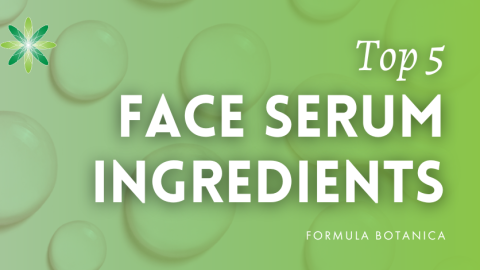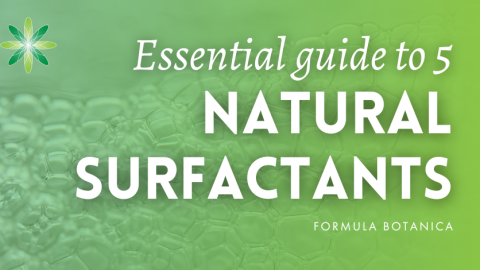“Is this ingredient considered natural?” is one of the most frequently asked questions by our students when they research cosmetic ingredients. It is followed closely by queries about how to use an ingredient, what percentages are optimal and what to replace them with.
There are thousands of ingredients to be used in cosmetics in the world and new ones are added to that collection every week. Therefore researching ingredients is one of the most important skills for an organic skincare and haircare formulator.
When researching an ingredient, you’ll need to cover seven research areas which we will guide your through in this blog post.
Firstly, you need to start with the INCI of your ingredient. The INCI (the International Nomenclature of Cosmetic Ingredient) is the internationally recognised and utilised system for ingredients used in cosmetics. To find the INCI of an ingredient, we recommend using the European Commission’s CosIng database.
Now that you have the INCI, let us see where you can gather more information.
1. The Student Library at Formula Botanica
You don’t need to go far. Once you have enrolled with Formula Botanica, our students and graduates have access to a wealth of knowledge in the Student Library of our award-winning eLearning platform, where you can research cosmetic ingredients. The 150+ page Ingredient Directory and our Scientific Research Library save our students a lot time researching. We constantly update our resources so make sure you read our Student Newsletter to stay informed.
2. Datasheets and suppliers
The biggest source of datasheets is ULprospector. The team at Formula Botanica uses this source every day! You only need to register with a business email address (no Hotmail, Yahoo or Gmail will be accepted). Once you are in, you can search for almost every cosmetic ingredient in the world.
There are a lot of trusted suppliers all over the world that pride themselves with providing good and proper information on their websites. You should visit the websites of your trusted suppliers and check if they have more information for you. Please don’t stop there: you can also contact that trusted supplier and ask if they want to sell this ingredient. Ask them why they do or don’t.
Not sure where to start finding shops selling ingredients? Check out our Global Supplier Guide located in the Student Library, available to all our enrolled students.
In case you cannot source an ingredient, here are our tips on how to swap ingredients in a formulation.
3. Scientific research
Scientific research reports are going to teach you a lot about your ingredient. Use the INCI name of your ingredient and use keywords like skin, cosmetics, dermal, topical or the specific effect you are researching in the search bar of one of the scientific websites.
Moreover, once you have your brand, you need to make sure you rely on science, say the correct information and educate your customers. The two main sites we recommend for scientific articles are Google Scholar and Pubmed. Use these two sites to research cosmetic ingredients and see what information is available.
We also recommend becoming a member of the UK’s Society of Cosmetic Scientists (open to anyone around the world) as you will then receive a regular copy of the International Journal of Cosmetic Science, which is packed full of fascinating research. All Formula Botanica students and graduates can request a reference from our team to join the Society.
4. Organic certified bodies
When students ask “is this ingredient organic?“, they mostly mean “can I use this ingredient in organic skincare?“. The easiest way to figure this out is to search the ingredient databases of the organic certification bodies, such as :
But be careful, natural doesn’t always mean organic and what natural means to you may be different from others. Listen to this podcast where Lorraine and Gemma discuss the 4 shades of natural.
5. Trusted blogs and podcasts
Blogs aren’t always trustworthy. Everyone can start and write a blog, without any knowledge, experience or even desire to spread honest information, which can be problematic when you start to research cosmetic ingredients – Google is so tempting.
We are sure that by now there are a few blogs you regularly read but in case you need some inspiration, here are some of our favourites:
- The Formula Botanica blog
- The Formula Botanica podcast
- Herb & Hedgerow
- Tisserand Institute
- Humblebee & me
6. Trade shows
Nothing beats a trade show when it comes to hunting for information about new ingredients. You can talk to suppliers, producers and often try products made with the ingredients you are interested in.
When attending a trade show, don’t forget to take your time and network. Get on the lists of interesting companies and ask them for samples. Make sure they’ll remember you, hand out your business cards.
On Global Organic Trade you can find a list of international trade shows in organic skincare. We also recommend the In-Cosmetics conferences – you can even listen to our podcast episode on the top 10 trends we noticed at In-Cosmetics Global 2018.
7. The Ultimate Step: Buy it and try it!
Researching isn’t only theoretical. Now it is time to get hands-on, buy the ingredient and formulate with it. Once you start to research cosmetic ingredients, you need to feel, smell and see the ingredient to get to know it properly. Take extensive notes and take photos. And remember to always use your formulation journal.
Remember, if you didn’t write it down, it didn’t happen.
Now it is your turn: what ingredient are you going to research next? Share it with us in a comment below.
FAQs
What are organic skincare ingredients?
Organic skincare ingredients need to be certified by various bodies to be authenticated as genuinely organic. Entities certifying organic status include such bodies as the UK-based Soil Association which covers ingredients at source, working with farmers and growers. The Soil Association joined forces with Ecocert, Cosmos, and other bodies to create a single standard for the certification of organic cosmetics. These bodies work internationally, but there are similar certifying bodies in different parts of the world. Brussels-based Natrue, the International Natural and Organic Cosmetics Association, and the US Department of Agriculture (USDA) are other bodies certifying the organic status of cosmetic ingredients.
Are organic products natural?
Use of the word organic is highly regulated and cosmetics bearing organic on their labeling should be certified by recognised, organic certification bodies such as the Soil Association, USDA, Ecocert, Natrue and similar. However, these entities are often at variance about the percentage of organic ingredients required in a cosmetic for them to be certified organic. Some certifying bodies require only 20 per cent of a cosmetic product to contain organic ingredients. The USDA requires 70 per cent to be organic. This means that the remaining part of the formulation may contain ingredients both natural, but not organic, and also synthetic ingredients. Cosmetics labeled organic may therefore not always be 100 per cent natural.
What is the best organic skincare brand?
There is no straight answer to which organic skincare brand is the best. In fact, it would go against advertising standards in most jurisdictions for a skincare brand to claim it is the best in any aspect. Do your research into your chosen organic cosmetics brand. Check out its status and claims. Many organic certification bodies such as the Soil Association offer lists of brands and companies they certify. Check the ingredients listed on the packaging or website. While the INCI names may occasionally be the same for both the natural and synthetic-derived ingredients, it will provide clues as to the natural, if not organic, nature of the formulation.
What ingredients are good for your face?
Your choice of skincare is very personal and highly dependent on your budget, your skin’s own specific needs, whether you have mature, sensitive, acne-prone skin and so on. Dermatologists and aestheticians will also advise you on which ingredients will be of benefit in resolving your particular skin issues. Overall, natural and organic formulations using high-quality ingredients such as cold-pressed botanical oils, and unrefined or minimally-processed natural ingredients may prove a good option for facial skincare. Natural, organic cosmetic ingredients can be rich in beneficial phytosterols, lipids and natural forms of hyaluronic acid, adaptogens and peptides, and include antioxidants and vitamins such as E and C, as well as minerals. Many of these natural ingredients help improve the skin’s barrier, prevent trans-epidermal water loss, and scavenge free radicals which indirectly cause the visible signs of premature ageing.
Leave us a comment

Priscilla Rolvers is a herbalist and natural cosmetic formulator and is based in the Netherlands. She was a grading tutor at Formula Botanica from 2017-19. Read more about the Formula Botanica Team.



























